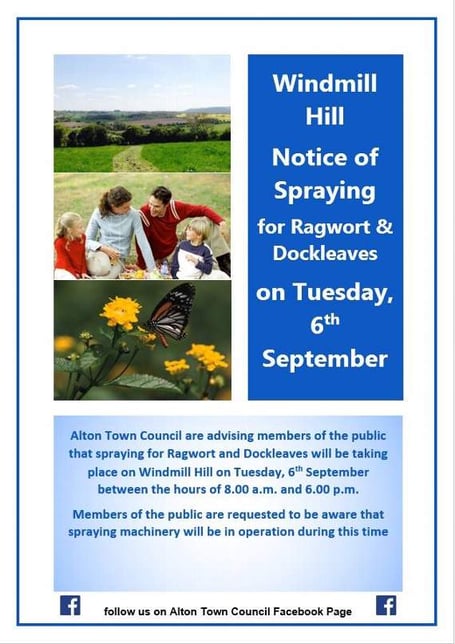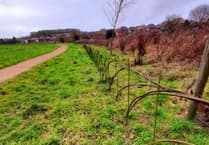ALTON Town Council has defended its decision to spray against ragwort and dock leaves on Windmill Hill this week following criticism from concerned residents.
In a “courtesy notice” to walkers, the authority said it had commissioned spraying on Tuesday in a bid to get rid of the undesirable flora.
But Michelle Essenson wrote to the council to say she was “disgusted” when she heard about the planned works.
“This area has so many rare and beautiful wildflowers - how can the council advocate such destruction of a sensitive area?” she said.
“Surely there are council members who understand the value and importance of biodiversity and are working to ensure the council meets its responsibility to protect and enhance biodiversity?
“If so, why are you not stopping the spraying until a proper land management plan is put in place?”
She also urged Alton Town Council to ensure the land is treated in a way that “protects the rare orchids and other flora and fauna at the site” and accused the council of not complying with the Department for Environment, Food and Rural Affairs’ (Defra) guidance on land management.
“I understood that protection of the meadow was part of the agreement to develop the nearby areas so I cannot understand how indiscriminate spraying is allowed - especially when other control methods such as spot treatment are available,” she added.
“You have the opportunity to involve members of the community in looking after this land, volunteers who would gladly pull and cut ragwort before it seeds to ensure ragwort control and biodiversity protection.
“Surely it is preferable to look after the land in ways that are supported by and include community involvement?”
Further concerns came from Ginny Boxall who spoke of her “horror” at the news, and said “local people have been outraged about this wanton environmental vandalism”.
“As a keen supporter of biodiversity in our local environment I am fed up with some of the myths that persist about the perceived dangers that ragwort poses to livestock and the felt need of farmers and local councils to eradicate it with toxic spraying,” she added.
However, the town council insisted the selective broadleaf weedkiller used “only works on the ragwort and dock leaves”.
“The ragwort cannot be left untreated as it is poisonous,” the council added.
“The work is carried out by a reputable local farmer who we have used on previous occasions.
“He is not applying insecticide and the chemicals used are not harmful to those using the site.”
In a report set to be discussed by the town council this week, town clerk Leah Coney outlined the situation, highlighting current Natural England, Defra and Environment Agency guidance which states that landowners “must prevent invasive non-native plants” from “spreading into the wild”.
Any landowner failing to do so “could be fined up to £5,000 or be sent to prison for up to two years”.
The clerk added: “The site is sprayed as required with a broadleaf weed killer (on average this is every two years) to prevent harmful weeds from growing with the grass as hay containing harmful weeds is unsafe for animals.
“The ragwort is not hand pulled as we do not have a licence to dispose of it and the site is considered too large to make hand-pulling a cost effective solution.
“As a responsible landowner Alton Town Council complies with the current guidance.
“Notice was given to the public of the spraying to ensure that walkers were aware of the tractor movements on the site whilst the work was being undertaken.
“At this time the town council can only act in accordance with Natural England’s guidance as they are responsible for enforcement but if their guidance changes then of course Alton Town Council will review its current practice in line with any revision in management methodology.”





Comments
This article has no comments yet. Be the first to leave a comment.